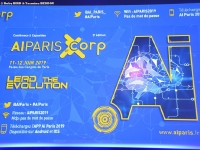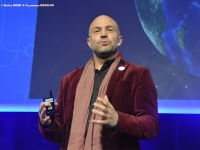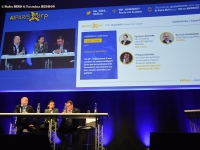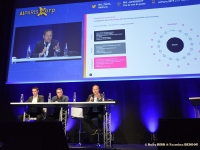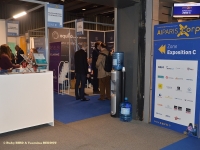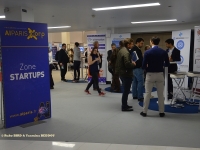Technology
AI PARIS 2019 By CORP - LEAD THE EVOLUTION (3rd EDITION)
Palais Des Congres,June 12-13, 2019

Cédric O Secretary of State for the Digital (Source: © Ruby BIRD & Yasmina BEDDOU)
USPA NEWS -
In computer science, artificial intelligence (AI) is intelligence demonstrated by machines, in contrast to the natural intelligence displayed by humans and animals. Colloquially, the term "artificial intelligence" is used to describe machines that mimic "cognitive" functions that humans associate with other human minds, such as "learning" and "problem solving". As machines become increasingly capable, tasks considered to require "intelligence" are often removed from the definition of AI, a phenomenon known as the AI effect...
In computer science, artificial intelligence (AI) is intelligence demonstrated by machines, in contrast to the natural intelligence displayed by humans and animals. Colloquially, the term "artificial intelligence" is used to describe machines that mimic "cognitive" functions that humans associate with other human minds, such as "learning" and "problem solving". As machines become increasingly capable, tasks considered to require "intelligence" are often removed from the definition of AI, a phenomenon known as the AI effect. A quip in Tesler's Theorem says "AI is whatever hasn't been done yet". For instance, optical character recognition is frequently excluded from things considered to be AI, having become a routine technology. Modern machine capabilities generally classified as AI include successfully understanding human speech, competing at the highest level in strategic game systems (such as chess and Go), autonomously operating cars, intelligent routing in content delivery networks, and military simulations.
Artificial intelligence can be classified into three different types of systems: analytical, human-inspired, and humanized artificial intelligence. Analytical AI has only characteristics consistent with cognitive intelligence; generating cognitive representation of the world and using learning based on past experience to inform future decisions. Human-inspired AI has elements from cognitive and emotional intelligence; understanding human emotions, in addition to cognitive elements, and considering them in their decision making. Humanized AI shows characteristics of all types of competencies (i.e., cognitive, emotional, and social intelligence), is able to be self-conscious and is self-aware in interactions with others.
Machine learning (ML), a fundamental concept of AI research since the field's inception, is the study of computer algorithms that improve automatically through experience. Natural language processing (NLP) gives machines the ability to read and understand human language. Machine perception is the ability to use input from sensors (such as cameras (visible spectrum or infrared), microphones, wireless signals, and active lidar, sonar, radar, and tactile sensors) to deduce aspects of the world. Applications include speech recognition, facial recognition, and object recognition. Computer vision is the ability to analyze visual input. AI is heavily used in robotics. Advanced robotic arms and other industrial robots, widely used in modern factories, can learn from experience how to move efficiently despite the presence of friction and gear slippage. Affective computing is an interdisciplinary umbrella that comprises systems which recognize, interpret, process, or simulate human affects....
In the near term, the goal of keeping AI´s impact on society beneficial motivates research in many areas, from economics and law to technical topics such as verification, validity, security and control. Whereas it may be little more than a minor nuisance if your laptop crashes or gets hacked, it becomes all the more important that an AI system does what you want it to do if it controls your car, your airplane, your pacemaker, your automated trading system or your power grid. Another short-term challenge is preventing a devastating arms race in lethal autonomous weapons.
In the long term, an important question is what will happen if the quest for strong AI succeeds and an AI system becomes better than humans at all cognitive tasks. As pointed out by I.J. Good in 1965, designing smarter AI systems is itself a cognitive task. Such a system could potentially undergo recursive self-improvement, triggering an intelligence explosion leaving human intellect far behind. By inventing revolutionary new technologies, such a superintelligence might help us eradicate war, disease, and poverty, and so the creation of strong AI might be the biggest event in human history. Some experts have expressed concern, though, that it might also be the last, unless we learn to align the goals of the AI with ours before it becomes superintelligent.
- In PARIS, (Palais des Congrès), on June 11-12, 2019, was held a huge Event organized around Conferences, Exhibitions, Workshops, Keynotes, Track Consulting, Experience Feddbacks and Awards : "LEAD THE EVOLUTION". AIPARIS Event féderates, since three years, the Domestic Market of AI offering a complete overview of opportunities, perspectives, technologies, and key meetings to meet your challenges. More than 5,000 Attendees, 110 Sponsors and Exhibitors, 80 Speakers, Two Conference Roms, 40+ Workshops.
- Which Sectors are concerned ?
* Banks, Finance, Insurance
* Industry, Transportation
* Retail, Ecommerce, Large Retail
* Public Institutions,
* Media, Publicity
* University Research and Training
* Telecoms
* Energy
* Chemistry, Pharma, Health
(...)
- Who are the Participants in the event ?
* CEO's
* Commercial Management, Marketing Department, Communication Department
* Projects Management
* Data Scientits, Data Analysts
* Consulting
* CTO, Architectes IT, Developpers
* R&D, Innovation
* Education
(...)
Source : AIPARIS By Corp, on June 11-12, 2019 @ Palais des Congrès (Paris - France)
Ruby BIRD
http://www.portfolio.uspa24.com/
Yasmina BEDDOU
http://www.yasmina-beddou.uspa24.com/
* Banks, Finance, Insurance
* Industry, Transportation
* Retail, Ecommerce, Large Retail
* Public Institutions,
* Media, Publicity
* University Research and Training
* Telecoms
* Energy
* Chemistry, Pharma, Health
(...)
- Who are the Participants in the event ?
* CEO's
* Commercial Management, Marketing Department, Communication Department
* Projects Management
* Data Scientits, Data Analysts
* Consulting
* CTO, Architectes IT, Developpers
* R&D, Innovation
* Education
(...)
Source : AIPARIS By Corp, on June 11-12, 2019 @ Palais des Congrès (Paris - France)
Ruby BIRD
http://www.portfolio.uspa24.com/
Yasmina BEDDOU
http://www.yasmina-beddou.uspa24.com/
Ruby Bird Yasmina Beddou Artificial Intelligence Paris Ai Paris 2019 Corp Big Data Dat Marketing Blockchain Content Factory Conferences Workshops Cedric O Exhibitions Networking
Liability for this article lies with the author, who also holds the copyright. Editorial content from USPA may be quoted on other websites as long as the quote comprises no more than 5% of the entire text, is marked as such and the source is named (via hyperlink).

